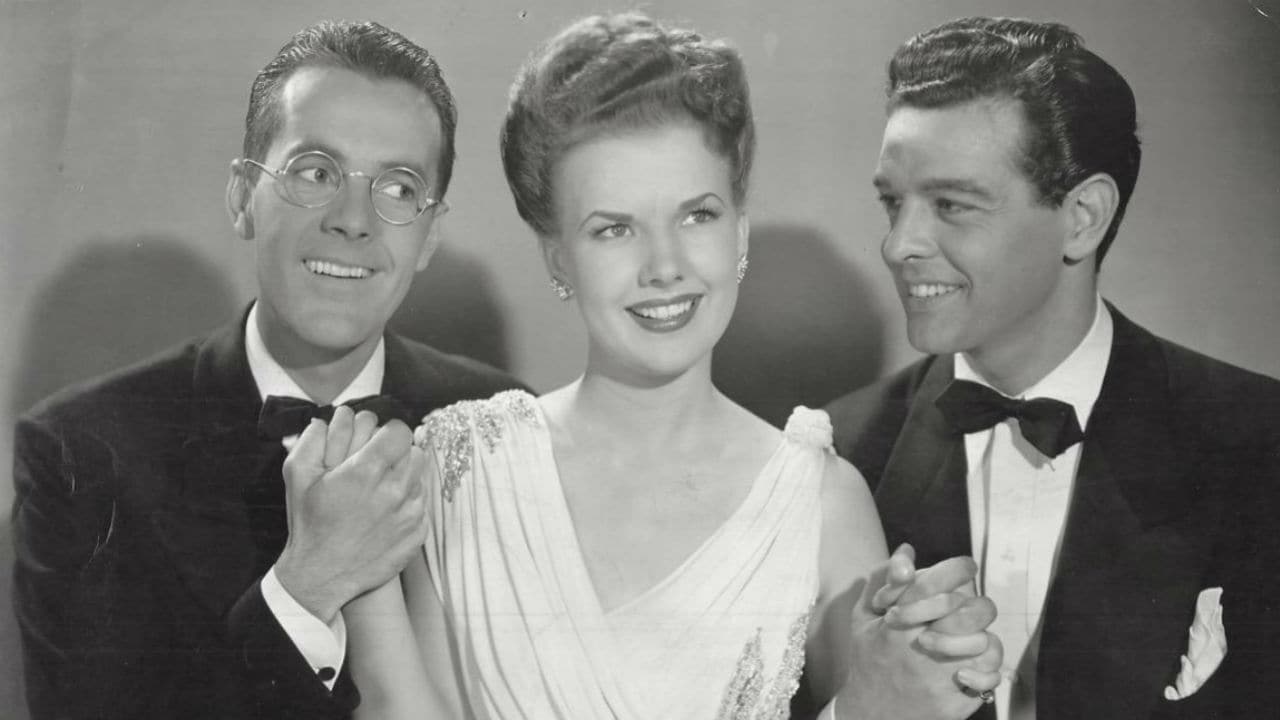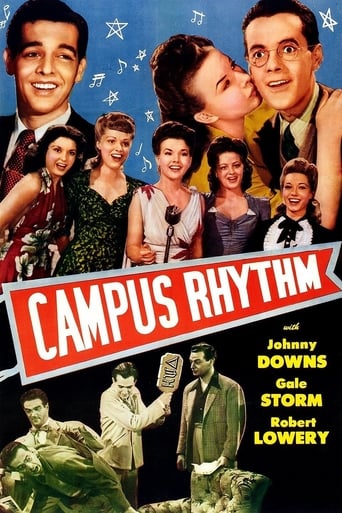Laikals
The greatest movie ever made..!
AshUnow
This is a small, humorous movie in some ways, but it has a huge heart. What a nice experience.
Myron Clemons
A film of deceptively outspoken contemporary relevance, this is cinema at its most alert, alarming and alive.
Geraldine
The story, direction, characters, and writing/dialogue is akin to taking a tranquilizer shot to the neck, but everything else was so well done.
mark.waltz
You never know what to expect from Monogram films. Some of their low budget movies are now considered sleeper classics, films at the time made simply to make a quick buck that somehow got noticed as a surprising work of art. Others are entertaining but forgettable, and in the case of this musical, it's instantly forgettable and often annoying. The plotline concerns a radio singer (Gale Storm) who wants to go from her latest gig to college so she can have a real life, but signed against her will to a new contract by uncle Douglas Leavitt. Taking the name of the radio station's secretary Marie Blake, she heads to college where she tries to blend in with the other co-eds, but creates a stir by performing in a local talent show where her voice is instantly recognized over the station. Thanks to a rival co-ed (Claudia Drake), Storm's identity is exposed because of Drake's boyfriend's (Robert Lowery) attraction to her, although Storm seems to be more enamored of the college newspaper editor (Johnny Downs) who is more serious about a future outside of college than the others around him.This has the subplot of the annoying Johnny Duncan often breaking into song with several various voices: one a Gracie Allen squeak, the other a Lionel Stander rasp. His novelty number is hideously wretched, although there's a funny moment when his girlfriend GeGe Pearson tries to rehearse her song for the college talent show and ends up with laryngitis, ultimately forcing the reluctant Storm to go on for her. I will give this film credit for one aspect however concerning the lives of the young students jazzing it up in the war years. In spite of what was going on around the world, their zest for life was unlimited and their music and dancing inspired the development of rock and roll a decade later and continues to inspire musicians today. So those of younger generations can look back and see how their grandparents (or great grandparents) lived when they were in their teens and realize that nothing much has changed but the date and the advancement of technology.
JohnHowardReid
Johnny Downs (Scoop), Gale Storm (Joan), Robert Lowery (Buzz), Candy Candido (Harold), Ge-Ge Pearson (Babs), Doug Leavitt (Uncle Willie), Herbert Heyes (Hartman), Marie Blake (Susie), Johnny Duncan (freshman), Claudia Drake (Cynthia), and Tom Kennedy.Director: ARTHUR DREIFUSS. Screenplay: Charles R. Marion. Additional dialogue: Albert Beich, Frank Tarloff. Original story: Ewart Adamson, Jack White. Photography: Mack Stengler. Film editor: Richard Currier. Art director: David Milton. Music director: Edward J. Kay. Songs: "Walking the Chalk Line" by Jules Lohman, Louis Herscher; "Swing Your Way Through College" by Andy Iona Long, Louis Herscher; "It's Great To Be a College Girl" and "College Sweetheart", both by Louis Herscher. Additional music: Edward Cherkose. Production manager: Dick L'Estrange. Sound recording: Tom Lambert. Producer: Lindsley Parsons.Copyright 8 October 1943 by Monogram Pictures Corp. No recorded New York opening. U.S. release: 19 November 1943. Australian release through British Empire Films: 20 April 1944. 5,624 feet. 62 minutes.SYNOPSIS: She's Singing Her Way Through College.COMMENT: This Monogram musical has Gale Storm, but little else to recommend it. That else includes a few jokes, buried in a tot of talk ("Since 1 was knee-high to a grasshopper"; "Say, you sing a swell song!"); plus a female voice impersonator; plus of course some mildly melodic songs. Typically dull direction from Arthur Dreifuss is not calculated to improve the picture's overall appeal. As I say, that appeal rests almost entirely on Gale Storm. You either like her or you regard her with indifference. Fortunately for me (and this review), I really like her!Nonetheless, you would think FIVE writers could come up with something more amusing, exciting and colorful than this ho-hum pastiche!
ksf-2
Shown on Turner Classic Movies. So half the cast is thirty, playing college students, and the rest of the cast wasn't much younger. There are more musical numbers here than there is plot.... the typical college campus antics. A whole lot of singing in this shortie. Gale Storm is Joan Abbott, who is sick of her job, and for SOME reason, has to change her name and go back to college. Not quite sure why she needed to change her name... were people not allowed to quit their job in the 1940's ? They send "uncle willie" to track her down and bring her back, and we watch HIM while he watches HER exercise in the gymnasium... a little creepy. Then there's the voice gag, where Candy Candido's voice (that's a guy, not a chick) keeps going high and low, even multiple times in the same sentence. Might have been fun the first time, but the repetition gets annoying, especially when he signs "Me, Myself, and I".Directed by Arthur Dreifuss, who also directed Riot on the Sunset Strip, which is SO much more interesting, and is based on actual events in Los Angeles. Watch that one instead.
chipe
I always had a fondness for Gale Storm since I enjoyed her in the "My Little Margie" TV series in the early 1950's. I had never seen her movies till I just saw a few on TCM cable TV. Pretty, perky Gale is the only really good thing in this movie.This movie is a great example of "suspension of disbelief." Gale's character is the top singer on U.S. radio, who flees radio and her contract to attend college under an alias (she wants to enjoy the life of an average college girl). Even though she is a RADIO star, it seems unbelievable that no one on campus would recognize/suspect who she is especially after it is announced that she is hiding in some unknown college under an alias!I wish to draw attention to one clever scene in this routine movie: how she foils her uncle's attempt to expose her and bring her back to radio. Humorous Uncle Willie (played to good effect by Douglas Leavitt ) follows a lead that she is at a certain college. He sneaks into the girl's gym to find her, but accidentally tears his pant-leg. Gale then comes across him and has him go into the empty girl's dressing room. She says she will return with a needle and thread to sew the pants, which he is to toss out the door when she returns. However, she tells on him to the gym instructor. He tosses out the pants and is about to be booked by the cops, but Gale pleads for him by making a deal with the cops that if he promises to leave town and never return, he won't be charged as a pervert to spare his family scandal.

